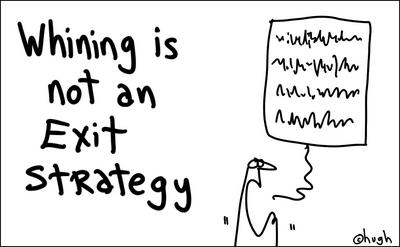What’s your exit strategy?
“What? Who? Are you talkin’ to me??”
If you are about to jump ship or you are plotting to move your career elsewhere in the next 3 to 5 years, then I’m talking to you. And here is a serious question that you should be consistently considering:
How will your leadership be regarded after you have left the job and have hit the road?
In considering your leadership legacy and beginning to work on an exit strategy, you need to be concerned with three thing:
Your ideas, your initiatives, and your people.
I’m sure you’ve had some great ideas and maybe even implemented several of them. But will they persist after you have gone? Will both your initiatives and the people on your team shine when you are not there to mentor them anymore? What is your legacy going to be once you are no longer there? Here are the three things to think about in building that better legacy.
On Ideas
Every leader has the responsibility to come up with creative problem solving ideas that are supposed to keep things running smoothly. Some positions require a lot more ideas coming in than others. Some workplace environments are more conducive to change, while others are more reluctant to the concept of implementing “new & improved” ideas. But no matter whether you are overtly required to come up with ideas or not, it is going to be required of you in some degree. And as a leader, your ideas matter. So take a look at the ones you have already created.
So, do your ideas stick around after you are not pushing them?
Are they dependent upon you, or did you build them with longevity and a legacy in mind? a great leadership legacy has tried and true ideas that stand the test of time.
On Initiatives
Structuring change so that a smooth implementation is engineered with collaboration and buy-in from all quarters involved is key to a successful plan roll-out. And just like with any strong structure that is built to last, it is also foundational to the long term success of your project after you’ve moved on. Perhaps you wrote the product launch procedure, you developed the new marketing communication program, or you’ve created the strategy for increased client sales.
How are you rolling it out to the team and to the company so that it is effectively communicated and designed for efficiency?
How much are you involved day to day and what happens when you go on vacation? A great leadership legacy is built with plans that roll out smoothly so that foundations are built with strength and durability.
On People
It’s inevitable that some on your team will require more hand holding than others. And what about those whose goal is to take over your job. Are you afraid of that occurrence and are trying to thwart their efforts? Or are you grooming them for the future with confidence and poise? If you have in mind securing a great leadership legacy, you will be asking yourself compelling questions that allow you the freedom to leave gracefully.
Ask yourself: “How am I helping the right person achieve eventual success in my current position?” And “Who is next in line to take over my position and responsibilities when I have moved on?
Preparing your team through training and mentoring in addition to providing critical information is key to setting them up for success when you’re gone. I’ve found that allowing those working for you to spin and toil on their own problems and allowing them to come up with their own solutions helps them grow more quickly than if I had stepped in to intervene immediately.
When I help someone who has less knowledge or experience with a critical sales call or with a leadership presentation, it continues a mentoring process that both stretches my employee as well as enables them to appreciate me for my responsibilities. This helps everyone learn and grow toward a better legacy.
Some of us truly are indispensable and control information critical for our position. How are you making this available and easy to understand for the one who follows you?
The mark of a great leader is the legacy one leaves behind.
How your company survives and recovers from your absence is a tribute to your leadership.
Are you setting up your company for success in the long term? What is your exit strategy? Will the company remain strong and not falter upon your departure?
————————————————————————————-
Jennifer Werth is the founder and principle consultant of a training and engineering service organization. She can be reached via email, [email protected] and through her blog.
Image Source: farm1.static.flickr.com













